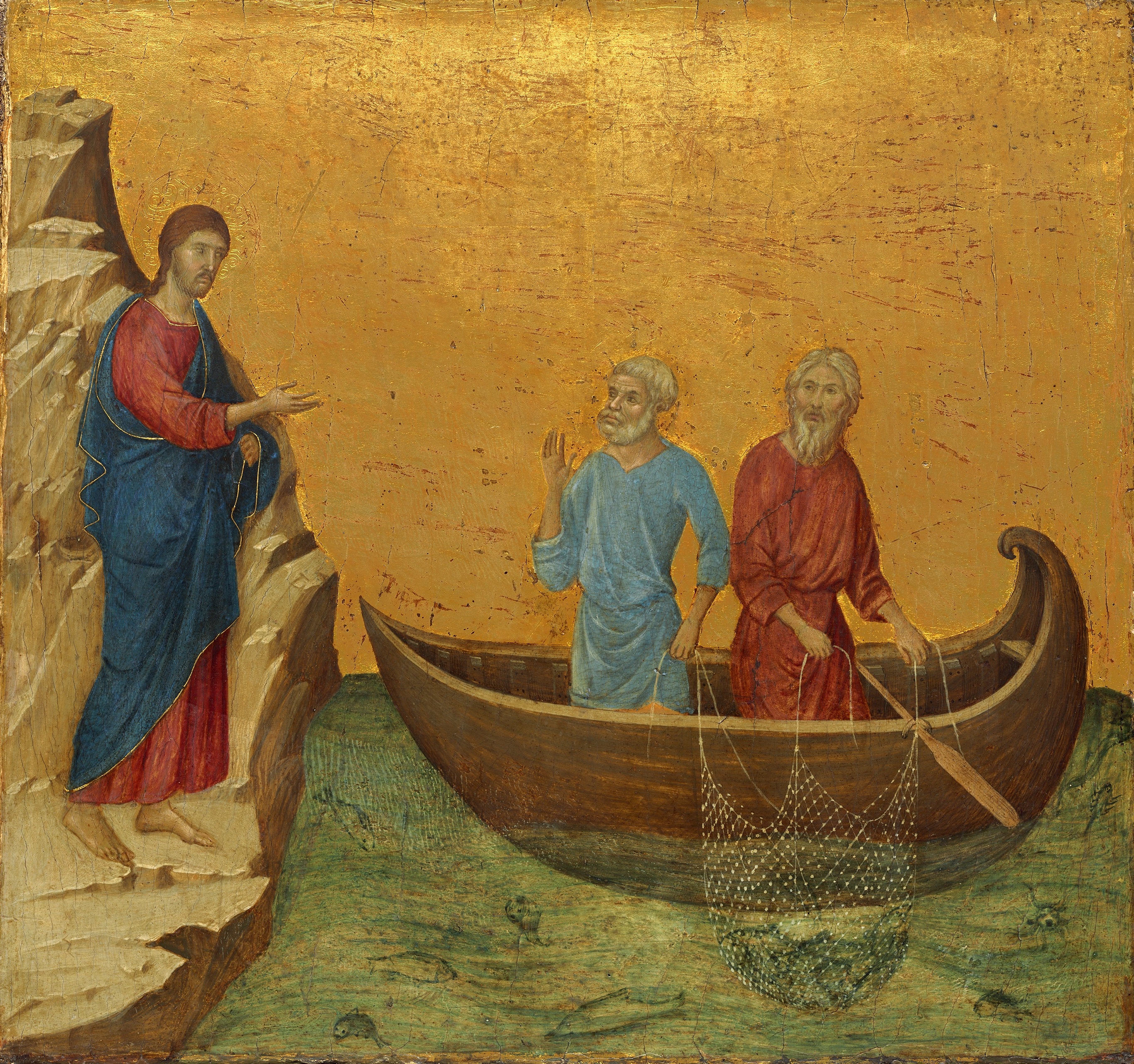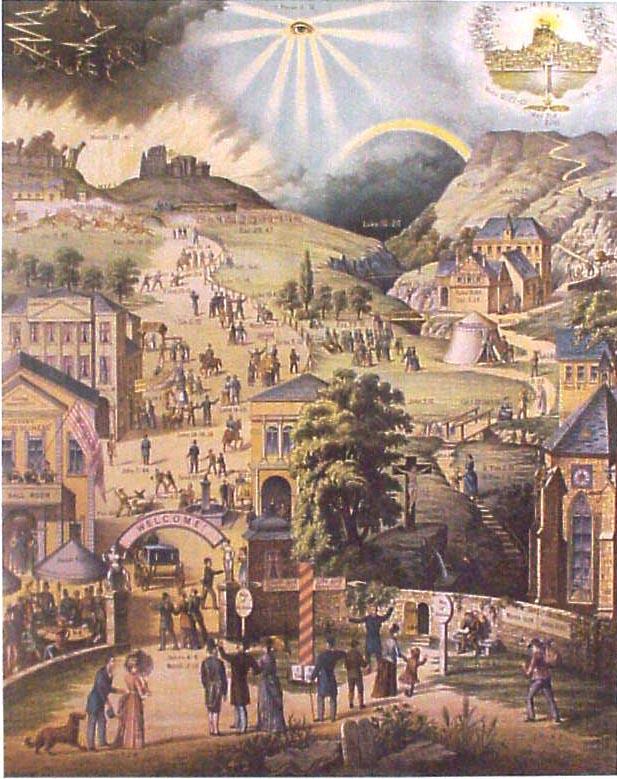 |
| The calling of Simon and Andrew. |
Not the conventionally moral. He chooses Matthew, a tax collector—rather as if he had chosen a used car salesman today. Not well-educated, wealthy, upstanding citizens: carpenters and fishermen.
Matthew 4:18-22 New International Version (NIV): Jesus Calls His First Disciples:
18 As Jesus was walking beside the Sea of Galilee, he saw two brothers, Simon called Peter and his brother Andrew. They were casting a net into the lake, for they were fishermen. 19 “Come, follow me,” Jesus said, “and I will send you out to fish for people.” 20 At once they left their nets and followed him.
21 Going on from there, he saw two other brothers, James son of Zebedee and his brother John. They were in a boat with their father Zebedee, preparing their nets. Jesus called them, 22 and immediately they left the boat and their father and followed him.
There are a few striking things here. First, note that in both cases, brothers are called as a group. This implies that there is something in their family situation, as siblings, that makes them suitable. Now note too that they abandon their family situation with alacrity. “At once.” In the case of James and John, they actually abandon their father sitting in the boat. If he was not absolutely furious about this, he must at least have wondered what was going on. But he gets no explanation. “They left their father Zebedee in the boat with the hired men and followed him” (Luke).
So leaving the family situation seems to involve specifically leaving the father, or the parents.
To drive the point home, a little later, a man approaches Jesus asking to become a disciple, as soon as he has buried his father. Jesus refuses him: “Leave the dead to bury their own dead.” When his own mother appears and asks him to come home, he responds “What have I to do with thee, woman?” And he tells others, “Call no man father but your father who is in heaven.” This is often taken as a rap against the Catholic Church, for calling priests “Father.” This misses the plain meaning of the phrase, which is far more radical. So much for family values.
Jesus discourages another potential follower with the cryptic observation “Foxes have holes, and the birds of the air have nests, but the son of man has nowhere to lay his head.” This seems to make leaving one's home the essential feature of Christian discipleship. Instructing his apostles for their evangelizing mission, he says “Brother will deliver brother over to death, and the father his child, and children will rise against parents and have them put to death” (Matthew 10:21). “I have come,” he warns “to set a man against his father, and a daughter against her mother, and a daughter-in-law against her mother-in-law. And a person's enemies will be those of his own household. Whoever loves father or mother more than me is not worthy of me, and whoever loves son or daughter more than me is not worthy of me.” (Matthew 10:35-7). This is sometimes translated as “he who does not despise his father and mother is not worthy of me.”
 |
| The Twelve: Romanesque. |
This is surely a consistent message. One can only go so far with it: the Old Testament does say “honour thy father and thy mother. And Jesus himself reaffirms the Old Testament commandment to “honour thy father and thy mother.” The apparent conflict can be explained, at least in part, by understanding the Old Testament commandment to refer specifically to an obligation to care financially for your parents in old age, as they provided for you in childhood. Even given this, however, surely it is too much to say that there is something wrong with families and parents as such. Like anything else in creation, they are an intrinsic good; but a good too easily transformed into an idolatry, preventing a greater good. It seems that the New Testament and Jesus hold that there is something terribly wrong with some families, and, specifically, with the families of those especially called to be Christians.
In other words, the sheep, the good people to whom Christianity is in the first place addressed, are those who are products of abusive and dysfunctional families.
The fact that those Jesus calls are ready to drop everything and leave their families at once to follow him—to run away-- is, to him, prima facie proof that they are indeed the ones he is seeking. They have been seeking an opportunity to escape.
Remember all those worries about religious cults in the sixties and seventies? Remember parents hiring “deprogrammers” to kidnap their own children? Early Christianity must have been like that. Kids from dysfunctional, overly controlling families, are naturally and properly called to a religious life.
It does seem as though there must be a large middle ground, between those who have suffered abuse from dysfunctional families, on the one hand, and the hypocrites and Pharisees on the other. Doesn't that leave a lot of people out?
Maybe not. Nothing in the New Testament promises salvation to the vast majority. Quite the reverse, in fact.
 |
| Narrow is the way ... |
But it may also be that there is a reasonable distinction to be made between apostle and disciple. It may be that abuse conditions you for a position of leadership, of priesthood, like the apostles, while simply avoiding hypocrisy is sufficient for lay discipleship. The apostles, as the first priests and bishops, are given special charisms and a special mission: to heal the sick, cast out demons, and raise the dead. Not your everyday “good deeds,” as the boy scouts understand it. They are, like the survivors of the Dymphna complex in literature, spiritual healers and spiritual heroes.
Not incidentally, we have an obvious solution here to the current shortage of priests in the Catholic church. God may be sending us the shortage to alert us that we have been looking for vocations in the wrong places. Perhaps we should leave our recruiting pamphlets in the psychiatrists; offices.
Second, this suggests that the depressed, and perhaps the mentally ill in general, are a valuable resource we have been simply squandering. Instead of being shunned and put in institutions or on welfare, they should be consulted by those who are ill, especially those who are “mentally ill.” They might well, as the traditions suggest, have the charism of healing.
I note that this is the common assumption in shamanic societies. Even in modern Korea, I discovered that those showing symptoms of mental illness, indeed psychosis, commonly go on to make a profession and a living for themselves as mudangs, shamans. Leading comfortable, “normal” lives. In our culture, some make a life for themselves as “artists,” using their special sensitivity to the spiritual. But due to a very small market for the arts, that can only be a small minority of the abused.
Which is a waste.













No comments:
Post a Comment